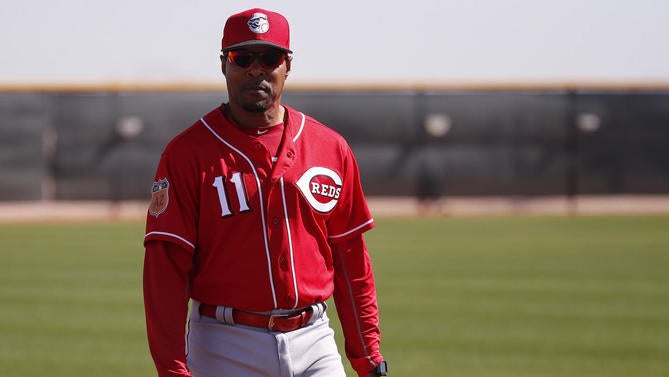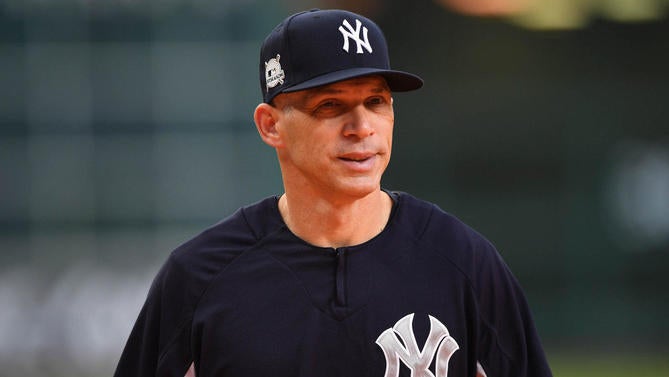Thursday morning, the Cincinnati Reds fired manager Bryan Price after he spent years on the hot seat. Price's job security had been in question since way back in 2015. Now, with the Reds off to an MLB worst 3-15 start, the team decided to make a change. Price and pitching coach Mack Jenkins were let go.
The Reds named bench coach Jim Riggleman their interim manager and say they will conduct a "thorough managerial search for a permanent replacement" later this year. It certainly doesn't sound like this will be a quick process. The Reds are rebuilding and they want to find the right guy to lead a young roster going forward. It takes time.
Price was let go Thursday morning, so the managerial search is in its infancy. Here are a handful of potential managerial candidates the Reds could consider as they usher in a new era in Cincinnati, starting with a Reds legend.

Barry Larkin: Larkin, the Hall of Famer and Cincinnati native, would be more than a nepotism hire. He managed during the World Baseball Classic and has been considered for managerial jobs in the past, most notably interviewing with the Tampa Bay Rays a few years ago, after Joe Maddon left. Larkin also declined an invitation to interview with the Detroit Tigers for their managerial opening several years ago.
The 53-year-old Larkin or course has goodwill with the fan base and he's an instant respect guy. He's a Hall of Famer, a World Series champion, and a Reds icon. Young players will look up to him. Interestingly enough, earlier this year Larkin told Zach Buchanan of the Cincinnati Enquirer he wants to manage the Reds and the Reds only. From Buchanan:
He's a fan of his current workload – he travels two-and-a-half weeks out of every month during the season to work with players at the Reds' various minor-league affiliates – but he admits his interest in managing is greater than it's ever been. Still, he has eyes only for the Reds.
"I only want to be in Cincinnati," Larkin said.
Larkin also told Buchanan he believes the Reds need to improve things on the minor league side, and wants to ensure there is more cohesion between the MLB staff and the minor league staff before jumping into a managerial role. Simply put, he wants the Reds to improve their player development before he considers taking over as manager.
Beyond his status as a Reds legend, Larkin has a great interest in player development and experience working with young players. The Reds are rebuilding -- the Reds are still rebuilding, I should say -- and finding a manager with an knack for helping young players figures to be a top priority. Larkin fits the bill. Everything else he brings to the table in terms of status is gravy.
Brad Ausmus: The former Detroit Tigers manager is currently working with the Los Angeles Angels as a special advisor to GM Billy Eppler. His tenure with Detroit went similar to Price's tenure with the Reds. The team didn't perform as expected early on, they took too long to decide to rebuild, and the manager took the brunt of the blame for the team's performance.
Fair or not, Ausmus' stint with the Tigers is considered a failure, and the Reds may not want to bring in a new manager with that sort of reputation. That said, Ausmus has managerial experience, and he's very bright, which led to him landing his current front office gig. Countless managers failed in their first go round before finding success in subsequent managerial jobs.
Buddy Bell: Bell, now 66, is currently working a senior vice president and special advisor with the Reds, and will presumably be involved in the managerial search. Bell played 18 years in the big leagues and managed three teams over nine seasons. A move back to the dugout at this point would be a surprise -- Maddon is baseball's oldest manager at 64 -- given the travel and time commitment, though it shouldn't be ruled out entirely. Bell has the relevant experience and a history with the organization.
John Farrell: Farrell, the former Boston Red Sox manager, currently works with the Reds as a scout, and when he was hired a few weeks ago it was easy to think he was the manager-in-waiting. Farrell has won a World Series, he has extensive coaching and managerial experience, and he's long been regarded for his work with pitchers. The Reds desperately need help on the pitching side. A manager who can develop arms would be a nice get. Farrell is already in the organization and his credentials figure to make him a candidate for the permanent managerial position.
Joe Girardi: The New York Yankees made the somewhat surprising decision to replace Girardi last year, after getting to within one game of the World Series. Girardi is taking time away from the game now -- he is doing some television work with MLB Network -- but has made it clear he wants to manage again one day. His managerial credentials are as good as they come. A World Series title, a Manager of the Year award, and a career .554 winning percentage in 11 seasons.

The question might not be whether Girardi is right for the Reds, but whether the Reds are right for Girardi. He's an accomplished manager who may wait for a better situation to come along, meaning a team with a chance to contend right away. Girardi is still young, he's only 53, and he figures to be in very high demand come managerial hiring season this winter. Selling him on a Reds team that will likely again be one of the worst in baseball in 2018 may be difficult.
Pat Kelly: Kelly (the former big league catcher, not the infielder) has been elevated to interim bench coach after managing the Reds' Triple-A affiliate, the Louisville Bats. He's worked his way up the managerial ranks in Cincinnati's farm system over the years -- Kelly started as a rookie ball manager in 2007 and gradually climbed to Triple-A -- and he's worked with many of the young players on the big league roster. The interim bench coach gig will be his first big league coaching position, but he has a plethora of minor league experience, and a history in player development. It stands to reason he will be considered for the permanent managerial position.
Jim Riggleman: The Reds named Riggleman, Price's bench coach since 2016, their interim manager Thursday. He's spent several years in the minors building trust and working his way back to the big leagues after abruptly resigning as Washington Nationals manager back in 2011. It would not at all be unprecedented for an interim manager to later be named the permanent manager -- Atlanta Braves manager Brian Snitker first took over as the interim manager in 2016, for example -- and Riggleman does have plenty of coaching and managerial experience. Does the club want a fresh start and a new direction? If yes, naming a holdover from Price's coaching staff the new manager may not be the best idea.

